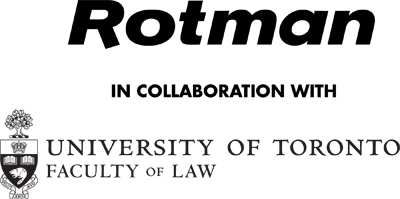Launched in 2017-18, Rotman@Law is an exciting collaboration between the Faculty of Law and the Rotman School of Management that gives law students access to three pre-MBA online courses in accounting, finance and statistics. Featuring some of Rotman’s top instructors, these courses are designed to provide students who have little or no business education with an easy-to-grasp introduction to basic concepts and skills. They are also useful refreshers for others.
Rotman@Law Certificate
The Rotman@Law program is structured as a certificate. Students must complete all three courses to receive a Rotman@Law certificate of completion. Students will be assessed to have completed a course when they have observed all online sections of the course, and have attempted all quiz questions with at least 60% of answers correct. Students have two opportunities to answer a question correctly.
Each course should take 5-6 hours of seat time to complete. This includes watching the videos and completing the quizzes.
2L and 3L students are eligible to participate now. 1L students will be given access after final exams are over in April.
To qualify to receive the certificate, students must complete (as described above) all 3 courses before August 31 of the year during which they will graduate with their J.D. Qualifying students will receive the certificate via email. To obtain a certificate after completing the requirements, students should email cathy.alzner@utoronto.ca
Please note: Rotman@Law courses are not for credit and do not count towards the J.D. degree requirements.
Rotman@Law courses
General structure
Courses are structured into modules. A module is a broad topic like, “Descriptive Statistics” and contains a number of smaller sub-topics (e.g. histograms, mean/median/mode, etc.). Each subtopic will usually have at least one video, and usually some multiple choice questions to help students test their understanding. In Quantitative Reasoning for Management there are a few spreadsheets that students need to download, but this is explained very clearly in the course (the download link is always immediately below the video).
Students will be able to see the correct answer to a quiz question once they’ve attempted it two times by clicking “Show Answer”.
2024-25 Rotman@Law courses
Financial Accounting
The course modules are designed for students who have little or no familiarity with financial accounting concepts. The goal of the course is to provide you with a broad familiarity of the building blocks on which almost all financial accounting is built, and help ease your transition into the course. The modules consist of readings, short videos, and online exercises.
Foundations of Finance
The goal of this course is to develop a solid foundational understanding of the key concepts and methods in finance. The course will cover the ideas behind time value of money, bond valuation, stock valuation, Capital Asset Pricing Model, risk and return, and market efficiency emphasizing both the intuition and the techniques. The videos will be followed by practice problems. Basics of finance calculations will be demonstrated in Excel video tutorials.
Quantitative Reasoning for Management
The goal of this course is to show students how statistics can be used to solve many day-to-day problems that arise in a business environment or organization. The key ingredient in making decisions to affect change within an organization however is to understand the process and the relative importance of its corresponding factors that are currently at play. For example, if productivity within an organization has been falling over the past few quarters, then the challenge for management is to reverse this trend. In order to reverse such a negative trend we first need to understand the factors that give rise to productivity and identify which of the factors is contributing to the falling productivity. Only with this understanding can effective strategies be implemented.
Accessing Rotman@Law courses
To become enrolled in the three Rotman@Law courses on Quercus, please contact cathy.alzner@utoronto.ca
Please note: The Rotman School of Management has graciously agreed to give access to their online courses to Law students. At this time, their instructors are not available to respond to law student questions about the course content. Please do not contact the course instructors directly.
Feedback about Rotman @ Law: "I wasn’t sure what to expect when I began it – I have a BComm already and didn’t know how much it was going to overlap. That being said, it proved to be a great refresher of some of the core concepts that I had covered years back during undergrad, and had apparently promptly forgotten! I would recommend this for anyone going into corporate law or transaction practice. While there is no direct connection to the law, the concepts that the courses taught underlie every business transaction that corporate lawyers help to effect – I can imagine that having a better understanding of clients’ business motivations will prove to be very valuable. It was great that I could speed up the videos (i.e. watch at 1.5x speed) when I felt that I remembered a concept well, so it wasn’t burdensome to be repetitive with BComm concepts. The quizzes were well structured and relevant. And lastly, the fact that students just need to achieve only 60% on each course to pass provided some much-appreciated flexibility, so I didn’t worry that getting a few questions wrong may cause all the time I spent on the courses to go to waste and disqualify myself from the certificate (particularly when this is completely optional for students and in addition to our relatively heavy workload in law school). While overall, the course took less time/effort than I expected it to, I was intimidated and hesitant at first by how much work I thought it would be in addition to my studies. That being said, I am happy that I completed it, and it proved to be a valuable refresher before starting articling in corporate law!" - Michelle Holmes, 3L |

